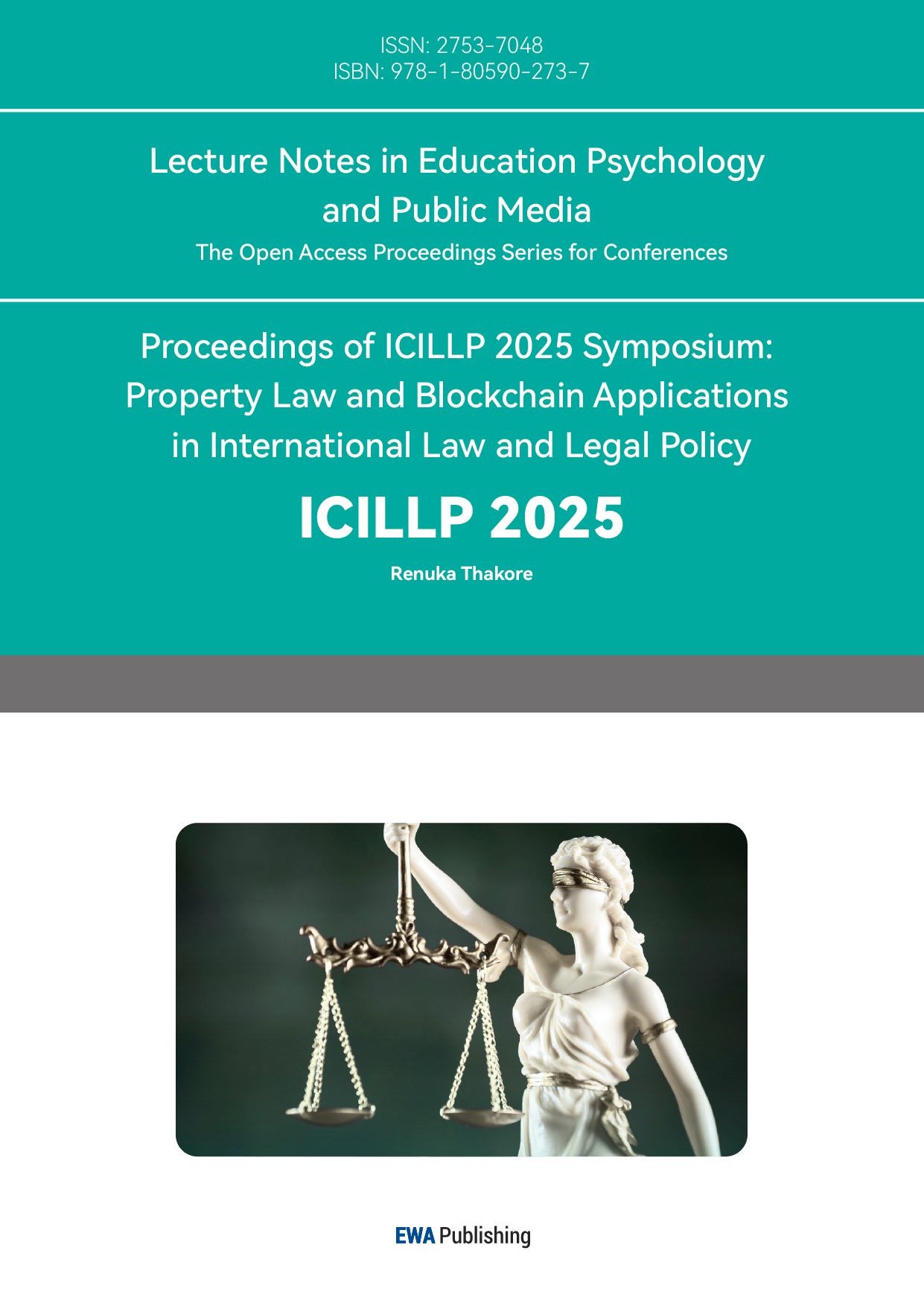References
[1]. Wang Suyuan. (2011). Legislative improvement of the rule against usurpation of corporate opportunities.
[2]. Suqian City Intermediate People's Court of Jiangsu Province. (2023). A real estate investment consultant limited company, Lu Moubing and others damage to the interests of the company liability disputes, (Su 13 Civil Final No. 1161). https: //wenshu.court.gov.cn/website/wenshu/181107ANFZ0BXSK4/index.html? docId=930s85qhV2PMK1qBUXlB5z+Uy0B6xAzNj9vo565Xqx61KivEZdw7VpO3qNaLMqsJ3OEMKjjmUwDrdBbzbSTW24zQcKApFmCmU9EKCf5expdD7/Sj+tS92Rp+ FD2wcQV3yYq2iPmP0mEF0FwCey0xjfWGMJ31NFkP
[3]. Shanghai Baoshan District People's Court. (2017). Shanghai Yangzhi Jiada Enterprise Management Co. Ltd. and Jin Xuejun liability dispute for damaging the company's interests, (Shanghai 0113 Minchu 15982). Retrieved from https: //wenshu.court.gov.cn/website/wenshu/181107ANFZ0BXSK4/index. html?docId=uTSeDHv6CJELtLDBV8LycEhHIQVuQQpopIle/a1hh6Ve443c4buaM5O3qNaLMqsJ3OEMKjjmUwDrdBbzbSTW24zQcKApFmCmU9EKCf5expdD7/Sj+tS92Rp +FD2wcQV3yYq2iPmP0mGxmdikg6Dj YHiExwBkoGdJ
[4]. Beijing Chaoyang District People's Court. (2021). Beijing Lutu Information Technology Co., Ltd. and Bao Lingxian liability dispute for damaging the company's interests, (Beijing 0105 Minchu 63655). Retrieved from https: //wenshu.court.gov.cn/website/wenshu/181107ANFZ0BXSK4/index.html ?docId=6X8yG55tLKKdYSjjaEdc2JVogsuv+P4Dp0HW0by5w/XO4IKTWww/5LZO3qNaLMqsJ3OEMKjjmUwDrdBbzbSTW24zQcKApFmCmU9EKCf5expdD7/Sj+tS92Rp+ FD2wcQV3yYq2iPmP0mGxmdikg6DjYKZyQvVds8L4
[5]. National People's Congress of China. (2023). Company Law of the People's Republic of China, Revision 2023. Retrieved from http: //www.npc.gov.cn/npc/c2/c30834/202312/t20231229_433999.html
[6]. Lui, Lai-Ming. (2006). On the Legal Protection of Business Opportunities. Chinese Law, (5), 107-114. DOI: 10.14111/j.cnki.zgfx.2006.05.009.
[7]. Shen, Guiming. (2019). Judicial Recognition of Corporate Business Opportunities. Jurisprudence, (06), 180-192.
[8]. Sun, Guanghui. (2022). Judicial empirical study of corporate opportunity rules. Jilin University.DOI: 10.27162/d.cnki.gjlin.2022.002290
[9]. China Judicial Big Data Institute. (2021). Application of the expert auxiliary person system in judicial practice. Retrieved from https: //xysfy.hncourt.gov.cn/public/detail.php?id=1277
[10]. Liu Guangtao. (2020). Shandong Shengtuo Industrial Company liability dispute for damage to the company's interests, (Lu 09 Min Final 243 civil judgment). Retrieved from https: //wenshu.court.gov.cn/website/wenshu/181107ANFZ0BXSK4/index. html?docId=81uw4q6F26cQ6U104Dy8Az7Rv2DhwHj4f2d+8kTvT6dXkuRTGiWc0ZO3qNaLMqsJ3OEMKjjmUwDrdBbzbSTW24zQcKApFmCmU9EKCf5expdD7/Sj+tS92Rp +FD2wcQV3yYq2iPmP0mGxmdikg6DjYHKK6mqsfo7V
[11]. Zheng Qian. (2024). The construction of reverse exclusion of corporate opportunity rules in the context of the amendment of the Company Law: The "judicial path" of valid defenses. Journal of Henan University of Finance and Law, 39(01), 47-59.
[12]. Cheng Sheng. (2001). Research on the legal issues of directors usurping the opportunities of the company. Shanghai People's Publishing House, 17.
[13]. Bo, Shou-Sheng. (2002). On the principle of corporate opportunity in the United States law--Another discussion on the civil law non-competition. Collection, (0).
[14]. Zhang, Yao-Ming. (2006). On the corporate opportunity doctrine. Social Science, (9), 111-117.
[15]. Wu, H.-D. (2003). The revolution of property dematerialization and the revolutionary law of immaterial property. Chinese Social Sciences, (4), 122-133.
[16]. Feng, Guo. (2010). Exploring the rule of "prohibiting usurpation of corporate opportunities". Chinese Law Journal, (1), 96-110.
[17]. Wang, Yanming, & Wang, Hongyun. (2017). Legal regulation of state-owned enterprise executives usurping corporate opportunities. Journal of Social Sciences of Jilin University, 57(6).



